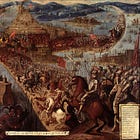Cinco de Mayo
Are we really doing this?
This Friday (tomorrow, if you're reading this the day it came out) is Cinco de Mayo. Yay!! Celebrate!!
But first, let's dispel with this common misconception: Cinco de Mayo is not Mexican Independence Day. That date is September 16. Cinco de Mayo commemorates an event that didn't even happen at the time of Mexico's independence; rather, it commemorates an event the occurred 50 years after independence, during the time of the Second French Intervention.
I'm sure you are all aware of the Second French Intervention, having read my pocket guide to Mexican history:
But to briefly catch you up: the Second French Intervention occurred partly as a result of then president of Mexico Benito Juarez declaring a moratorium on foreign debt payments (which France didn't like, because it was one of the foreign lenders), and party as a result of France wanting an imperial foothold in Mexico. France invaded Mexico and ended up (sort of) ruling it for approximately 3 years, from 1864 to 1867.
One of the earlier military conflicts that occurred when France invaded Mexico was the Battle of Puebla, which took place on May 5, 1862. This battle took place in the city of Puebla, which is the capital and largest city in the state of Puebla. French troops commanded by General Charles de Lorencez repeatedly attempted to capture two forts overlooking the city, but they were successfully pushed back by Mexican forces commanded by General Ignacio Zaragoza. The French ended up retreating to Orizaba, but would later return to capture the city in 1863.
The defeat of the better armed French was a big morale booster for Mexican forces at the time, and the Battle of Puebla is still celebrated today, but primarily in Puebla and in Mexico City. Most of Mexico doesn't really "celebrate" Cinco de Mayo, since the significance of the battle has faded considerably in importance over the years.
So why is Cinco de Mayo such a big deal in the U.S.?
Cinco de Mayo is more of a celebration in the U.S. than in Mexico1. Way more. To the point that - as the first paragraph of this article points out - most people in the U.S. just assume it must commemorate something truly significant in Mexican history, like independence. So how did it become such a big deal north of the border?
During the civil rights era, Mexican-Americans began pointing to Cinco de Mayo as a source of Mexican pride, and saw it as a celebration of that pride. Later, in the late 80's, large Mexican beer companies began ad campaigns riffing off of that civil rights era pride movement, calling Cinco de Mayo a day of celebration which should, of course, include the consumption of Mexican beer. These ad campaigns were hugely effective and really accelerated the "awareness" of Cinco de Mayo in the U.S., but since they were just pushing beer, U.S. celebrants were left to invent the significance of Cinco de Mayo in their own minds. Thus we are left with today's rather broad misinterpretation of the date amongst the U.S. population.
So, if you're celebrating Cinco de Mayo, you are probably in the United States, and you're just playing into the hands of Big Beer.
But there's nothing wrong with beer.
Cheers! 🍻
To be fair, Cinco de Mayo is a civic holiday in Mexico.





Interesting how we co-op "holidays" and turn them into drinking fests in the US. This, St. Patrick's Day. But then, in recent years I've become more attuned to the obsession our culture has with drinking in general.
Ha ha - this is interesting, as even I note when cinco de mayo comes around each year! And in fact I am going out friday to celebrate (that along with the full moon). Maybe I'm just stretching to find a reason to enjoy an evening with friends! Though hard kombucha is more my style now than beer. lol